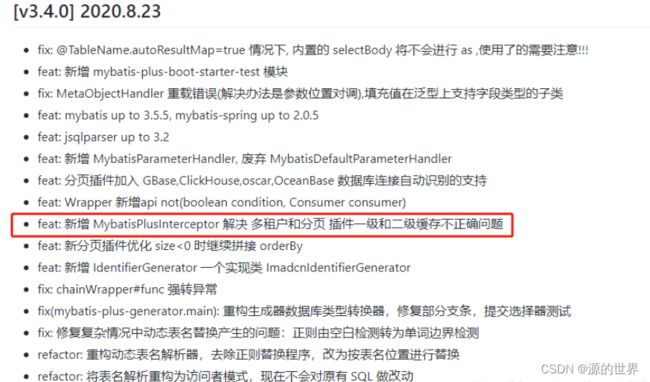Java-常用实现分页查询
文章目录
-
- 一.MyBatis-Plus 分页查询
-
-
- 1.介绍
- 2.版本问题:确认mybatis-plus-boot-starter版本
- 3.springboot方式-完整配置类(主要实现代码)
- 4.示例代码(实战-完整代码)
-
- 二.手动分页(不使用插件)
-
-
- 首先创建一个通用的PageBean类
- 实现层代码
-
- 三.分页查询-基础原理
-
-
- 分页查询
- 性能问题
- 使用合理的分页方式以提高分页的效率
-
一.MyBatis-Plus 分页查询
1.介绍
BaseMapper 接口提供了如下分页查询接口:
- selectPage:根据 entity 条件,查询全部记录
- selectMapsPage:根据 Wrapper 条件,查询全部记录
注意:在使用上面两个方法进行分页查询时,我们需要配置分页插件。这只是在介绍SpringBoot的使用。
2.版本问题:确认mybatis-plus-boot-starter版本
3.4.0版本对此部分有更新,如果是旧版本升级,会出现分页失效问题,同时idea会提示PaginationInterceptor过时,新版本改用了MybatisPlusInterceptor

3.springboot方式-完整配置类(主要实现代码)
/**
* 分页插件。如果你不配置,分页插件将不生效
*/
@Configuration
public class MybatisPlusConfig {
/**
* 旧版 -按需分配
*/
/*@Bean
public PaginationInterceptor paginationInterceptor() {
return new PaginationInterceptor();
}*/
/**
* 新版
*/
@Bean
public MybatisPlusInterceptor paginationInterceptor() {
MybatisPlusInterceptor interceptor = new MybatisPlusInterceptor();
// 指定数据库方言为 MYSQL
interceptor.addInnerInterceptor(new PaginationInnerInterceptor(DbType.MYSQL));
return interceptor;
}
}
分页查询
//pageNum 当前页数、pageSize 每页的显示数;relatedinformationMapper-mapper层;null-实体对象封装操作类(可为空)
Page<实体类> urf = relatedinformationMapper.selectPage(new Page<>(pageNum, pageSize), null);
System.out.println("数据为:" + urf.getRecords());
System.out.println("总数为:" + urf.getTotal() + ",总页数为:" + urf.getPages());
System.out.println("当前页为:" + urf.getCurrent() + ",每页限制:" + urf.getSize());
4.示例代码(实战-完整代码)
表user_relatedinformation 创建
DROP TABLE IF EXISTS `user_relatedinformation`;
CREATE TABLE `user_relatedinformation` (
`id` bigint(20) NOT NULL AUTO_INCREMENT COMMENT '主键',
`user_name` varchar(200) CHARACTER SET utf8 COLLATE utf8_general_ci NULL DEFAULT NULL COMMENT '用户姓名',
`user_phone` varchar(20) CHARACTER SET utf8 COLLATE utf8_general_ci NULL DEFAULT NULL COMMENT '用户手机号',
`user_address` varchar(200) CHARACTER SET utf8 COLLATE utf8_general_ci NULL DEFAULT NULL COMMENT '用户地址',
`user_detailed_address` varchar(200) CHARACTER SET utf8 COLLATE utf8_general_ci NULL DEFAULT NULL COMMENT '用户详细地址',
`status` varchar(20) CHARACTER SET utf8 COLLATE utf8_general_ci NULL DEFAULT NULL COMMENT '状态:0默认地址',
`flag` varchar(20) CHARACTER SET utf8 COLLATE utf8_general_ci NULL DEFAULT NULL COMMENT '是否有效 0无效 1有效',
`userid` bigint(20) NULL DEFAULT NULL COMMENT '用户id',
`add_time` datetime NULL DEFAULT NULL COMMENT '创建时间',
`upd_time` timestamp NOT NULL DEFAULT CURRENT_TIMESTAMP COMMENT '更新时间',
PRIMARY KEY (`id`) USING BTREE
) ENGINE = InnoDB AUTO_INCREMENT = 36 CHARACTER SET = utf8 COLLATE = utf8_general_ci ROW_FORMAT = Dynamic;
SET FOREIGN_KEY_CHECKS = 1;
pom包
<?xml version="1.0" encoding="UTF-8"?>
<project xmlns="http://maven.apache.org/POM/4.0.0" xmlns:xsi="http://www.w3.org/2001/XMLSchema-instance"
xsi:schemaLocation="http://maven.apache.org/POM/4.0.0 https://maven.apache.org/xsd/maven-4.0.0.xsd">
<modelVersion>4.0.0</modelVersion>
<parent>
<groupId>org.springframework.boot</groupId>
<artifactId>spring-boot-starter-parent</artifactId>
<version>2.7.3</version>
<relativePath/> <!-- lookup parent from repository -->
</parent>
<groupId>com.hn.yuan</groupId>
<artifactId>test_pages</artifactId>
<version>0.0.1-SNAPSHOT</version>
<name>test_pages</name>
<description>Demo project for Spring Boot</description>
<properties>
<java.version>1.8</java.version>
</properties>
<dependencies>
<dependency>
<groupId>com.alibaba</groupId>
<artifactId>fastjson</artifactId>
<version>1.2.21</version>
</dependency>
<!--spring项目启动器-->
<dependency>
<groupId>org.springframework.boot</groupId>
<artifactId>spring-boot-starter-web</artifactId>
</dependency>
<!--通过注解消除实际开发中的样板式代码-->
<dependency>
<groupId>org.projectlombok</groupId>
<artifactId>lombok</artifactId>
<optional>true</optional>
</dependency>
<!--spring项目测试启动器-->
<dependency>
<groupId>org.springframework.boot</groupId>
<artifactId>spring-boot-starter-test</artifactId>
</dependency>
<!--mybatis-plus启动器-->
<dependency>
<groupId>com.baomidou</groupId>
<artifactId>mybatis-plus-boot-starter</artifactId>
<version>3.5.1</version>
</dependency>
<!--mysql数据库驱动-->
<dependency>
<groupId>mysql</groupId>
<artifactId>mysql-connector-java</artifactId>
<version>5.1.35</version>
</dependency>
<!--代码生成器-->
<dependency>
<groupId>com.baomidou</groupId>
<artifactId>mybatis-plus-generator</artifactId>
<version>3.4.1</version>
</dependency>
<!--模板引擎-->
<dependency>
<groupId>org.apache.velocity</groupId>
<artifactId>velocity-engine-core</artifactId>
<version>2.1</version>
</dependency>
</dependencies>
<build>
<plugins>
<plugin>
<groupId>org.springframework.boot</groupId>
<artifactId>spring-boot-maven-plugin</artifactId>
</plugin>
</plugins>
</build>
</project>
application.yml
server:
port: 8081
spring:
datasource:
driver-class-name: com.mysql.jdbc.Driver
url: jdbc:mysql://localhost:3306/yuan_productlist?useUnicode=true&characterEncoding=UTF-8&useSSL=false
username: root
password: root
entity层代码
package com.hn.yuan.productList.entity;
import com.baomidou.mybatisplus.annotation.IdType;
import com.baomidou.mybatisplus.annotation.TableId;
import java.time.LocalDateTime;
import java.io.Serializable;
import java.util.Date;
import lombok.Data;
import lombok.EqualsAndHashCode;
/**
*
*
*
*
* @author XIAOCAO
* @since 2022-09-20
*/
@Data
@EqualsAndHashCode(callSuper = false)
public class UserRelatedinformation implements Serializable {
private static final long serialVersionUID = 1L;
/**
* 主键
*/
@TableId(value = "id", type = IdType.AUTO)
private Long id;
/**
* 用户姓名
*/
private String userName;
/**
* 用户手机号
*/
private String userPhone;
/**
* 用户地址
*/
private String userAddress;
/**
* 用户详细地址
*/
private String userDetailedAddress;
/**
* 状态:0默认地址
*/
private String status;
/**
* 是否有效 0无效 1有效
*/
private String flag;
/**
* 用户id
*/
private Long userid;
/**
* 创建时间
*/
private Date addTime;
/**
* 更新时间
*/
private Date updTime;
}
controller层代码
package com.hn.yuan.productList.controller;
import com.alibaba.fastjson.JSONObject;
import com.baomidou.mybatisplus.extension.plugins.pagination.Page;
import com.hn.yuan.productList.common.ResultMsg;
import com.hn.yuan.productList.entity.UserRelatedinformation;
import com.hn.yuan.productList.service.UserRelatedinformationService;
import org.springframework.beans.factory.annotation.Autowired;
import org.springframework.web.bind.annotation.PostMapping;
import org.springframework.web.bind.annotation.RequestBody;
import org.springframework.web.bind.annotation.RequestMapping;
import org.springframework.web.bind.annotation.RestController;
/**
*
* 前端控制器
*
*
* @author XIAOCAO
* @since 2022-09-20
*/
@CrossOrigin
@RestController
@RequestMapping("/userRelatedinformation")
public class UserRelatedinformationController {
@Autowired
private UserRelatedinformationService userRelatedinformationService;
@PostMapping("/pageUser")
public ResultMsg pageUser(@RequestBody JSONObject jsonObject) {
Page<UserRelatedinformation> page = userRelatedinformationService.pageUser(jsonObject);
return new ResultMsg(200, page, "成功查询");
}
}
serviceiml层代码
package com.hn.yuan.productList.service.impl;
import com.alibaba.fastjson.JSONObject;
import com.baomidou.mybatisplus.core.conditions.query.QueryWrapper;
import com.baomidou.mybatisplus.extension.plugins.pagination.Page;
import com.hn.yuan.common.bean.PageBean;
import com.hn.yuan.productList.entity.UserRelatedinformation;
import com.hn.yuan.productList.mapper.UserRelatedinformationMapper;
import com.hn.yuan.productList.service.UserRelatedinformationService;
import com.baomidou.mybatisplus.extension.service.impl.ServiceImpl;
import org.springframework.beans.factory.annotation.Autowired;
import org.springframework.stereotype.Service;
import org.springframework.util.CollectionUtils;
import java.util.ArrayList;
import java.util.List;
/**
*
* 服务实现类
*
*
* @author XIAOCAO
* @since 2022-09-19
*/
@Service
public class UserRelatedinformationServiceImpl extends ServiceImpl<UserRelatedinformationMapper, UserRelatedinformation> implements UserRelatedinformationService {
@Autowired
private UserRelatedinformationMapper relatedinformationMapper;
@Override
public Page<UserRelatedinformation> pageUser(JSONObject jsonObject) {
//当前页数
Long pageNum = Long.valueOf(String.valueOf(jsonObject.get("pageNum")));
//每页显示数
Long pageSize = Long.valueOf(String.valueOf(jsonObject.get("pageSize")));
//进行分页查询-可跟条件
Page<UserRelatedinformation> urf = relatedinformationMapper.selectPage(new Page<>(pageNum, pageSize), null);
System.out.println("数据为:" + urf.getRecords());
System.out.println("总数为:" + urf.getTotal() + ",总页数为:" + urf.getPages());
System.out.println("当前页为:" + urf.getCurrent() + ",每页限制:" + urf.getSize());
return urf;
}
}
vuejs-前端代码
<template>
<div>
<el-row>
<el-col :span="12">
<el-input
placeholder="请输入用户名称"
v-model="userName"
clearable
></el-input
></el-col>
<el-col :span="12">
<el-button type="success">搜索</el-button>
</el-col>
</el-row>
<el-row>
<el-col :span="24">
<el-main>
<el-table :data="tableData" style="width: 100%">
<el-table-column prop="id" label="id" width="180">
</el-table-column>
<el-table-column prop="userName" label="用户名称" width="180">
</el-table-column>
<el-table-column prop="userPhone" label="手机号" width="180">
</el-table-column>
<el-table-column prop="userAddress" label="地址"> </el-table-column>
<el-table-column prop="userDetailedAddress" label="详细地址">
</el-table-column>
</el-table> </el-main
></el-col>
</el-row>
<el-row>
<el-col :span="24">
<div class="block">
<el-pagination
@size-change="handleSizeChange"
@current-change="handleCurrentChange"
:current-page="pageNum"
:page-sizes="[10, 20, 30, 40]"
:page-size="pageSize"
layout="total, sizes, prev, pager, next, jumper"
:total="total"
>
</el-pagination>
</div>
</el-col>
</el-row>
</div>
</template>
<script>
import Axios from "axios";
export default {
data() {
return {
userName: "",
pageNum: 1, //当前页
pageSize: 10, //每页显示数
total: null, //总的记录数
tableData: [],
};
},
methods: {
handleSizeChange(val) {
this.pageSize=val;
this.pageUser();
console.log(`每页 ${val} 条`);
},
handleCurrentChange(val) {
this.pageNum=val;
this.pageUser();
console.log(`当前页: ${val}`);
},
pageUser() {
var that = this;
Axios({
method: "post",
url: "http://localhost:8081/userRelatedinformation/pageUser",
data: {
pageNum: that.pageNum,
pageSize: that.pageSize,
userName: that.userName,
},
}).then((res) => {
console.log(res.data.code)
if (res.data.code == 200) {
that.tableData = res.data.data.records;
that.pageNum = res.data.data.current;
that.pageSize = res.data.data.size;
that.total = res.data.data.total;
} else {
console.log("接口调用失败!");
}
});
},
},
created() {
this.pageUser();
},
};
</script>
<style scoped>
.el-row {
margin-bottom: 20px;
}
.el-col {
border-radius: 4px;
}
</style>
效果图:
二.手动分页(不使用插件)
首先创建一个通用的PageBean类
package com.hn.yuan.common.bean;
import lombok.Data;
import java.io.Serializable;
import java.util.List;
@Data
public class PageBean<T> implements Serializable {
private int pageNum; //当前页数
private int pageSize; //每页显示数
private int totalPage; //总页数
private int totalRecord; //总的记录数
private List<T> data; //当前页面的数据集合
private int start;
private int end;
public PageBean() {
}
public PageBean(int pageNum, int pageSize, int totalRecord) {
this.pageNum = pageNum;
this.pageSize = pageSize;
//计算总页数
this.totalPage=totalRecord%pageSize==0?(totalRecord/pageSize):(totalRecord/pageSize+1);
//计算每页的起始下标
this.start=(pageNum-1)*pageSize;
this.end=this.start+pageSize;
}
}
实现层代码
package com.hn.yuan.productList.service.impl;
import com.alibaba.fastjson.JSONObject;
import com.baomidou.mybatisplus.core.conditions.query.QueryWrapper;
import com.hn.yuan.common.bean.PageBean;
import com.hn.yuan.productList.entity.UserRelatedinformation;
import com.hn.yuan.productList.mapper.UserRelatedinformationMapper;
import com.hn.yuan.productList.service.UserRelatedinformationService;
import com.baomidou.mybatisplus.extension.service.impl.ServiceImpl;
import org.springframework.beans.factory.annotation.Autowired;
import org.springframework.stereotype.Service;
import org.springframework.util.CollectionUtils;
import java.util.ArrayList;
import java.util.List;
/**
*
* 服务实现类
*
*
* @author XIAOCAO
* @since 2022-09-19
*/
@Service
public class UserRelatedinformationServiceImpl extends ServiceImpl<UserRelatedinformationMapper, UserRelatedinformation> implements UserRelatedinformationService {
@Autowired
private UserRelatedinformationMapper relatedinformationMapper;
@Override
public PageBean<UserRelatedinformation> pageUser(JSONObject jsonObject) {
List<UserRelatedinformation> urf = relatedinformationMapper.selectList(null);
int totalRecord = 0;
if (!CollectionUtils.isEmpty(urf)) {
totalRecord = urf.size();
}
PageBean<UserRelatedinformation> pageBean = new PageBean<>(Integer.valueOf(String.valueOf(jsonObject.get("pageNum"))), Integer.valueOf(String.valueOf(jsonObject.get("pageSize"))), totalRecord);
List<UserRelatedinformation> data = new ArrayList<>();
for (int i = pageBean.getStart(); i < pageBean.getEnd(); i++) {
data.add(urf.get(i));
}
pageBean.setData(data);
pageBean.setTotalRecord(totalRecord);
return pageBean;
}
}
三.分页查询-基础原理
分页查询
客户端通过传递 start(页码),pageSize(每页显示的条数) 两个参数去分页查询数据库表中的数据。MySql 数据库提供的分页函数 limit m,n 用法和实际需求不切合,所以就需要根据实际情况去改写适合分页的语句。
❶ 查询第1条到第10条的数据 select * from table limit 0,10;
—>对应需求就是查询第一页的数据:select * from table limit (1-1)*10,10;
❷ 查询第11条到第20条的数据 select * from table limit 10,10;
—>对应需求就是查询第二页的数据:select * from table limit (2-1)*10,10;
❸ 查询第21条到第30条的数据 select * from table limit 20,10;
—>对应需求就是查询第三页的数据:select * from table limit (3-1)*10,10;
由此,得出符合需求的分页 sql 格式是:select * from table limit (start-1)*pageSize,pageSize;其中 start 是页码,pageSize是每页显示的条数。
性能问题
对于小的偏移量,直接用 limit 查询没有什么问题。随着数据量的增大,越往后分页,limit 语句的偏移量越大,速度也会明显变慢。
Ⅰ 优化思想:
避免数据量大时扫描过多的记录
Ⅱ 解决:
子查询的分页方式或者 JOIN 分页方式。JOIN 分页和子查询分页的效率基本在一个等级上,消耗的时间也基本一致。
一般 MySQL 的主键是自增的数字类型,该情况可以使用下面的方式进行优化。以真实的生产环境的 6 万条数据的一张表为例,比较一下优化前后的查询耗时:
-- 传统 limit,文件扫描
select * from table order by id limit 50000,2;
受影响的行: 0
时间: 0.171s
-- 子查询方式,索引扫描
select * from table
where id >= (select id from table order by id limit 50000 , 1)
limit 2;
受影响的行: 0
时间: 0.035s
-- JOIN 分页方式
select * from table as t1
join (select id from table order by id limit 50000, 1) as t2
where t1.id <= t2.id
order by t1.id limit 2;
受影响的行: 0
时间: 0.036s
优化原理:
子查询是在索引上完成的,而普通的查询是在数据文件上完成的。通常来说,索引文件要比数据文件小得多,所以操作起来也会更有效率。因为要取出所有字段内容,普通查询需要跨越大量数据块并取出,而另一种方式直接根据索引字段定位后,才取出相应内容,效率自然大大提升。因此,对 limit 的优化,是避免直接使用 limit,而是首先获取到 offset 的 id,然后直接使用 limit size 来获取数据。
在实际项目使用,可以利用类似策略模式的方式去处理分页。例如,每页 100 条数据,判断如果是 100 页以内,就使用最基本的分页方式;如果大于 100,则使用子查询的分页方式。
使用合理的分页方式以提高分页的效率
• 使用 limit 实现分页逻辑。不仅提高了性能,同时减少了不必要的数据库和应用间的网络传输。
• 查询结果只有一条或者只要最大/最小一条记录,建议用 limit 1。这是为了使explain中 type 列达到 const 类型。“limit 1”可以避免全表扫面,只要找到了对应的一条记录,就不会继续向下扫描了,效率将会大大提高。当然,如果查询字段是唯一索引的话,没必要加 limit 1,因为 limit 的存在主要就是为了防止全表扫描,从而提高性能,如果一个语句本身可以预知不用全表扫描,有没有 limit,性能的差别并不大。
• 使用如下语句做分页的时候,随着表数据量的增加,直接使用 limit 分页查询会越来越慢。
select id,name from product limit 89757, 20
优化如下:可以取前一页的最大行数的 id,然后根据这个最大的 id 来限制下一页的起点。此例中上一页最大的 id 是 89756。SQL 可以采用如下的写法:
//方案一 :返回上次查询的最大记录(偏移量)
select id,name from product where id> 89756 limit 20
//方案二:order by + 索引
select id,name from product order by id limit 10000,10
//方案三:在业务允许的情况下限制页数
理由如下:
• 当偏移量最大的时候,查询效率就会越低,因为 MySQL 并非是跳过偏移量直接去取后面的数据,而是先把偏移量+要取的条数,然后再把前面偏移量这一段的数据抛弃掉再返回的。
• 如果使用优化方案一,返回上次最大查询记录(偏移量),这样可以跳过偏移量,效率提升不少。
• 方案二使用 order by+索引,也是可以提高查询效率的。
• 方案三的话,建议跟业务讨论,有没有必要查这么多的分页。因为绝大多数用户都不会往后翻太多页。
【强制】在代码中写分页查询逻辑时,若 count 为 0 应直接返回,避免执行后面的分页语句。
转载原文链接:https://blog.csdn.net/ChineseSoftware/article/details/123521438

各位看官》创作不易,点个赞!!!
诸君共勉:万事开头难,只愿肯放弃。
免责声明:本文章仅用于学习参考
